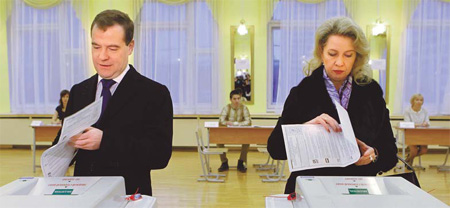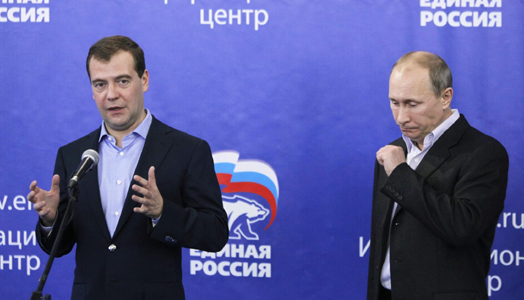Polling puts Putin to the test
Updated: 2011-12-05 07:00
By Li Xiaokun and Hu Yinan (China Daily)
|
|||||||||||
BEIJING - As Russians went to the polls on Sunday to decide the composition of their country's lower house of parliament for the next four years, Chinese analysts said the Kremlin's bold vision for a Eurasian Union would be a defining issue for Russia over the next few years.
 |
|
Russian President Dmitry Medvedev (left) and First Lady Svetlana Medvedeva vote on Sunday at a polling station in Moscow during parliamentary elections. [Photo/Agencies] |
United Russia, the ruling party, is still expected to have a clear majority but opinion polls have predicted that its nationwide poll rating will drop from 2007 when it secured a landslide majority of 64.3 percent and won 315 seats in the 450-member State Duma.
If the party gets fewer than two-thirds of the seats, it will lose its ability to single-handedly amend the nation's constitution.
"It comes as no surprise that United Russia will win the elections," said Jiang Yi, an expert on Russian studies with the Chinese Academy of Social Sciences (CASS).
"Whether the party can secure a two-thirds majority in the lower house reflects its political influence in the country," he said.
Seven political parties competed in Sunday's election for the 450 seats in the State Duma.
Earlier polls indicated that only four of them - United Russia, the Communist Party of the Russian Federation, the Liberal Democratic Party of Russia, and A Just Russia - would be able to cross the 7-percent threshold and win seats.
Russian Prime Minister Vladimir Putin, who served two terms as president between 2000 and 2008 and has been nominated by United Russia as its presidential candidate next March, proposed the formation of a Eurasian Union in October.
This new alliance, based on the current Common Economic Space between Russia, Belarus and Kazakhstan and modeled on the European Union, will be an intergovernmental community of sovereign states that incorporates both former Soviet republics as well as other states.
Finland, Hungary, the Czech Republic, Vietnam, Bulgaria, Cuba and Venezuela are some of the countries with "Russian economic interests" that could become part of the new union, Russian political scientist Dmitry Orlov was quoted as saying by Russian newspaper Kommersant.
"The tools and historical arguments are available to create the big project for a Eurasian Union that can unite 250 million people," said State Duma Speaker Boris Gryzlov.
In Beijing, Pang Dapeng, another expert on Russian politics with the CASS, said the idea "reflects Russia's judgment of the current global environment" in the face of the mounting European debt crisis and a troubled economy in the United States.
"This, in effect, means that Russia has found its global identity as a key player in the Eurasian continent," Pang said.
Sunday's elections were a factor in the Kremlin's recent assertiveness on the global stage, ranging from threatening to deploy missiles to target US missile defense sites in Europe to plans to send its only aircraft carrier to Syria, he said.
 |
|
Russian President Dmitry Medvedev (L) gestures as Prime Minister Vladimir Putin looks on during a news conference at the headquarters of the United Russia party after voting closed in parliamentary elections in Moscow Dec 4, 2011. [Photo/Agencies] |
Hot Topics
HIV/AIDS, Egypt protest, Thanksgiving, climate change, global economic recovery, home prices, high-speed railways, school bus safety, Libya situation, Weekly photos
Editor's Picks

|

|

|

|

|

|







